Category: new
Standing Together: A Call for Action to End Violence Against Women in Africa
Standing Together: A Call for Action to End Violence Against Women in Africa
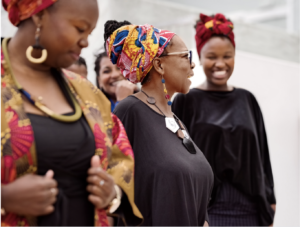
On November 25, the African Women’s Development Fund (AWDF) joins the world in observing the International Day for the Elimination of Violence Against Women commemorated under the theme UNiTE! Invest to Prevent Violence Against Women & Girls! This day which marks the beginning of the Sixteen Days of Activism against Gender Based Violence, highlights the ongoing global crisis of gender-based violence (GBV), which continues to rise despite progress in advocacy and legal protections. AWDF believes that ending GBV requires more than legal reforms and protective measures—it demands a fundamental shift in societal attitudes toward women’s rights. From West Africa to the Horn of Africa, women-led movements are at the forefront of this struggle, but they need more than support—they need sustained, concrete action.
AWDF’s Commitment to Ending Sexual Violence in West Africa
Sexual violence remains a pervasive issue in West Africa. According to a UN Women report (2018), over 60% of women in the region have experienced physical or sexual violence, with many survivors facing barriers to justice due to weak legal frameworks, inadequate support services, and prevailing social norms that condone such violence.
AWDF’s commitment to ending sexual violence focuses on strengthening local responses, bolstering legal protections, and creating safer spaces for survivors. In partnership with the Ford Foundation, OSIWA, and other local organizations, AWDF has launched an initiative to address and prevent sexual violence across West Africa. This initiative strengthens the capacity of women’s rights organizations to provide direct services to survivors, advocate for stronger laws, and shift harmful cultural norms that perpetuate sexual violence.
Through the KASA Initiative, AWDF has supported organizations to train over 300 law enforcement officers and reached 10,000 community members with educational programs on preventing sexual violence. By supporting local actors and leveraging international funding, AWDF is addressing the root causes of sexual violence and ensuring stronger protections for women and girls.
Discover inspiring stories from the AWDF’s KASA program, supporting feminist initiatives across Africa, and a concerning article on the 196 reported cases of rape in Senegal in the first half of 2024, highlighting the urgent need to strengthen efforts against sexual violence.
Learn more about KASA grantee stories
Read an article on sexual violence in Senegal
Strengthening Community Resilience and Feminist Solidarity
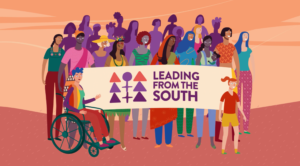
Feminist movements across Africa have shown remarkable resilience in the face of growing attacks from anti-rights groups. Through initiatives, we continue to build stronger, more resilient communities that can withstand patriarchal violence.
One of AWDF’s key pillars is solidarity. As global threats to women’s rights increase, the strength of our collective response becomes more critical. Through alliances like the LFS Fund, we are fostering a culture of mutual support. These networks allow women’s rights organizations, activists, and survivors of violence to come together to heal, strategize, and take collective action.
In Uganda, for example, through the LFS Fund, AWDF has partnered with local women’s organizations to provide legal aid and psychosocial support to survivors of sexual violence. This partnership has enabled over 4,000 survivors to access justice and healing services, and it has helped local communities become more active in combating violence through community dialogues and public education campaigns.
Explore the powerful stories of LFS grantees supporting feminist activism in the Global South, and learn about five more years of funding to sustain and expand these critical movements.
The Growing Threat of Anti-Rights Movements
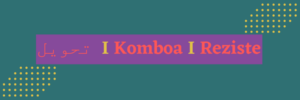
Across Africa, anti-rights movements are gaining momentum, threatening the rights of women and girls. From Uganda’s Anti-Homosexuality Act to recent rollbacks of sexual and reproductive health rights in Somalia, these regressive movements are a direct challenge to women’s rights. According to the UN Women’s Global Database on ViolenceAgainst Women, one in three women globally experiences physical or sexual violence in their lifetime, with African women facing some of the highest rates of sexual violence.
In Somalia, the repeal of the Sexual Offences Bill exemplifies the dangers posed by these movements. The bill, which sought to criminalize sexual violence, was a significant step forward in women’s rights. Its repeal has not only left women vulnerable to further violence but also highlights the vulnerability of legal protections in the face of regressive political agendas.
The Komboa Consortium, is Inspired by African feminist values of sisterhood, solidarity and mutual aid, the African Women’s Development Fund (AWDF), Initiative Sankofa d’Afrique de l’Ouest (ISDAO), Purposeful, Doria Feminist Fund, and Strategic Initiative for Women in the Horn of Africa (SIHA), have joined forces and resources to create Komboa (“Liberate” in Swahili) a feminist consortium that supports communities threatened by the rise of anti-rights and anti-gender movements.
Inspired by African feminist values of sisterhood, solidarity and mutual aid, the African Women’s Development Fund (AWDF), Initiative Sankofa d’Afrique de l’Ouest (ISDAO), Purposeful, Doria Feminist Fund, and Strategic Initiative for Women in the Horn of Africa (SIHA), have joined forces and resources to create Komboa (“Liberate” in Swahili) a feminist consortium that supports communities threatened by the rise of anti-rights and anti-gender movements.
The Role of International Advocacy and Accountability
AWDF recognizes that international advocacy is crucial in shaping global norms around gender-based violence. By collaborating with regional and international actors, AWDF plays a critical role in resourcing and nurturing organizations that hold governments accountable for their commitments under international human rights frameworks, including the Convention on the Elimination of All Forms of Discrimination Against Women (CEDAW) and the Maputo Protocol. By providing financial support and capacity-building, AWDF empowers grassroots organizations to advocate for the full implementation of these human rights instruments, ensuring that governments are held responsible for advancing gender equality and women’s rights across the continent.
Through policy dialogues and advocacy campaigns, AWDF continues to pressure governments to ensure stronger legal frameworks that prevent and respond to gender-based violence. For example, after a two-year advocacy campaign led by AWDF and local partners, the Kenyan government passed the Sexual Offenses Act, which provides stronger protections for women and girls, including harsher penalties for sexual violence and clearer guidelines for survivor support.
A Call to Action
On this International Day for the Elimination of Violence Against Women, AWDF calls on governments, civil society, and individuals across Africa and beyond to unite in the fight against violence. We urge continued investments in women’s rights organizations, especially those led by women in marginalized communities, and call on each individual to actively participate in ending gender-based violence. Whether through advocacy, education, or direct support for survivors, every action counts.
Let us come together to build a future where women and girls are safe, respected, and able to live free from fear of violence—today, tomorrow, and for generations to come.
Bintou Mariam Traoré, communications Officer
Bread and Butter #5: Legal Literacy as Integral to Rural Women’s Land Rights
Bread and Butter #5: Legal Literacy as Integral to Rural Women’s Land Rights

The concept of land is one that has been described as the cornerstone of economic development. According to Odeny (2013), land is one asset that farmers, pastoralists and other communities base their livelihoods. Land is also a significant component of business assets, which play significant role in business investment strategies. Thus, securing land rights can have a profound impact on economic development of any group of people.
This study situates land located in rural areas as both a means of agricultural production, livestock rearing and a place for gathering natural products that play an important role in local economies such as woodcutting, wild harvesting, grazing, fishing and hunting inter alia. In most cases, particularly among indigenous people, land is a source of identity and cultural heritage.
Read the second article in the second series here:
Legal Literacy as Integral to Rural Women’s Land Rights
Return of our Knowledge Product: Bread and Butter Series
Return of our Knowledge Product: Bread and Butter Series
We look to continue envisioning a future Africa that ensures women’s and girls’ sustainable livelihoods, meaningful labour, and full socio-economic autonomy.
Launched by AWDF in October 2018, the Bread and Butter Series is a knowledge product that culminated from the African women’s economic futures convening held in Accra in the same year. Twenty-seven (27) activists, academics, development workers and knowledge producers extensively discussed and engaged in workshop and group activities to build sound advocacy strategies aimed at shaping sustainable economic futures for African women. The convening was informed by AWDF’s fourth strategic plan Shaping the Future, and its accompanying Futures Trends Analysis Report which highlight evidence-based socio-economic trend implications projected for women and girls on the continent.
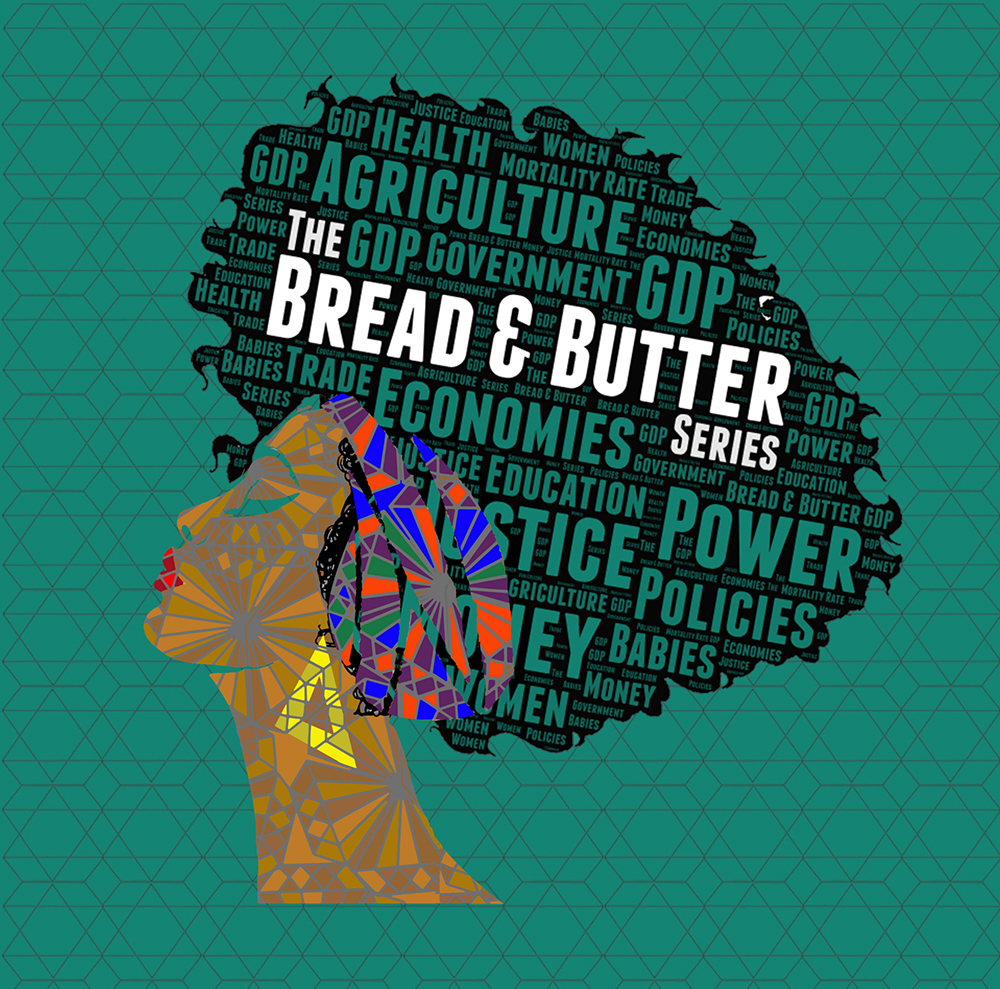
Read the first article in the second series here:
African Feminist Futures – Macro-economic Pathways
The expression “bread and butter” refers both to the ways in which individuals come to sustain themselves usually through paid work and individuals’ practical, every day needs and concerns. The economic futures convening was a first step in a journey to better support future-oriented strategies that engender African women’s economic justice and security. Since then, we have continued to work with dynamic African feminist writers to conceptualise, research, document and publish critical and radical perspectives about theirs and the experiences, contributions, needs and opportunities of African women and girls at micro and macro-economic levels.
Covering a range of topics from macro-economic policy pathways to the actual implication of distribution of economic resources at household level, this knowledge series affirms that African women’s economic issues are both internalised and challenged in everyday acts of resistance and solution-building. Moreover, that like never before, it is critical to, among other things, demystify economics as a white, male and Western concept that is out of reach for African women.
The Bread and Butter knowledge series uphold that all African women understand the consequences and solutions for oppressive neoliberal capitalist economic models and seek to encourage their voices as economic actors, thinkers and shapeshifters.
We invite your readership and engagement with the real “bread and butter” issues that women and girls face in Africa through the opinion pieces, research essays and narratives compiled in this series. And as you do, we look to continue envisioning a future Africa that ensures women’s and girls’ sustainable livelihoods, meaningful labour, and full socio-economic autonomy.
We hope that this series will engender new conversations about how we support African women to pursue economic justice and security. We also hope to contribute to a larger conversation about how philanthropic institutions regionally and globally can better support African women’s economic interests, as described by African women, themselves.
Do you have feedback on any of the Bread and Butter articles? Please email our Knowledge Management Specialist, dinnah@awdf.org
Bread and Butter #2: Advancing Resources for Rural Women Farmers
Bread and Butter #2: Advancing Resources for Rural Women Farmers

From 13-15 September 2018, the African Women’s Development Fund convened activists, scholars, researchers and policymakers to build a thoughtful, progressive and transformative vision for the Future of African Women and the Economy under AWDF’s Economic Justice and Security thematic area. This convening investigated the various ways that African feminists are engaged in critique, analysis and the re-visioning of African economies to provide justice and security for African women. The convening is part of a larger movement-building process and ongoing conversation around resourcing African women’s economic justice and security at AWDF. The Bread and Butter series is a multifaceted knowledge production project that springs out of the convening, reflecting AWDF’s commitment to providing feminist analysis of African women’s organising. The article below is the second Article of the series.
Bread and Butter Article 2: Advancing Resources for Rural Women Farmers by Sylvia Nalubega
Women are the primary food producers globally. Within the continent of Africa, 57% of total female
employment is within agriculture. The continent’s future of food security in the face of climate change will be largely centered on the resources afforded rural women farmers. However, gender inequality perpetuates biases in resources allocated to rural women farmers and their communities. ARUWE understands that the future of food security depends on a holistic, rightsbased approach to addressing gender inequality. Central to expanding the economic opportunities for rural women is access to financial services. In this article, Sylvia Nalubega (ARUWE Uganda) provides a case study analysis of ARUWE’s work, demonstrating how rural women’s access to
finance is a necessary component in securing food on the continent. ARUWE Uganda champions
rural women and supports their movement as they advocate for their rights to financial resources.
For the full Article please click the link below:
Statement from the Participants of AWDF’s 2018 Economic Convening on the Future of African Women and the Economy
Statement from the Participants of AWDF’s 2018 Economic Convening on the Future of African Women and the Economy
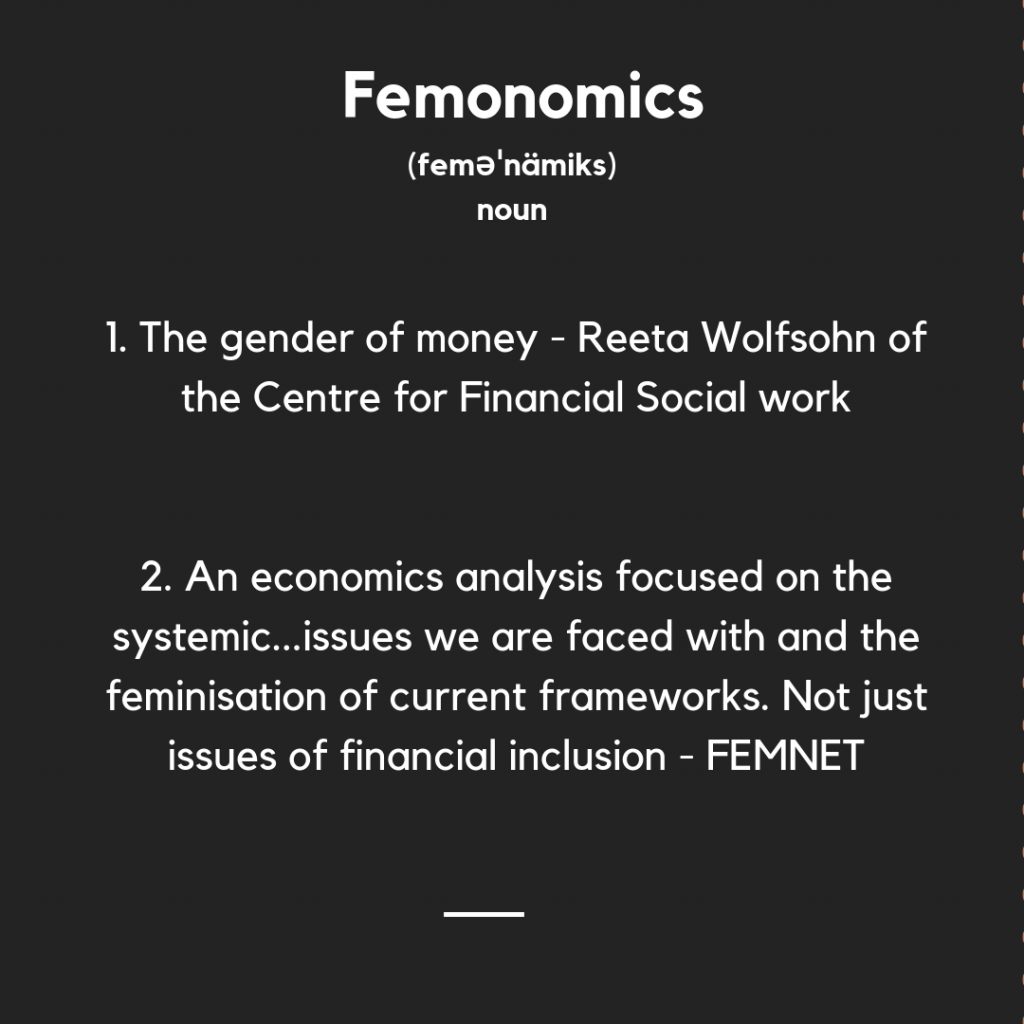
At the end of 2018’s AWDF’s Economic Convening the participants composed a statement. This statement from the participants of the convening, outlined their priorities and recommendations for securing African women’s economic futures.
Please click HERE to read the statement
The Bread and Butter Series: Growth for Whom? A Pan African Feminist Reflection on Macro Level Economic Policies
The Bread and Butter Series: Growth for Whom? A Pan African Feminist Reflection on Macro Level Economic Policies
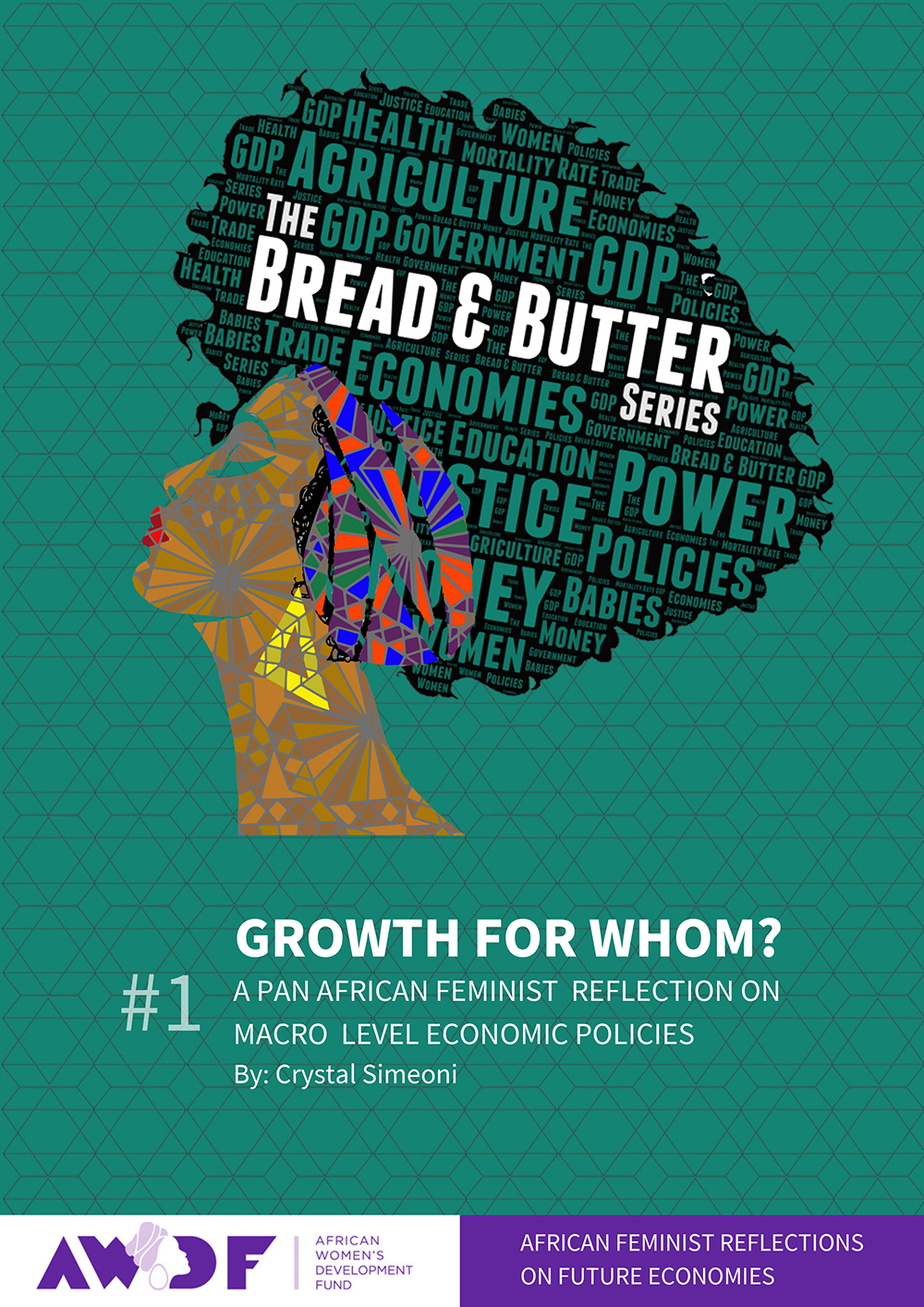
The first article in our Bread and Butter series was written by Crystal Simeoni from the African Women’s Development and Communication Network (FEMNET), convenors of the African Feminist Macroeconomics Academy. The article provides a feminist reflection on current neoliberal macro level economic policies in Africa and how they affect women’s lives. The writer argues that current definitions of women’s economic empowerment are too narrow to offer impactful strategies. This follows from increasing analyses that, in as much as Africa’s economies grow, so does inequality between her people. Simeoni argues that current neoliberal macroeconomic frameworks will continue to exacerbate the problem.
Please click HERE to read the article.
African Women’s Economic Futures Convening : Statement on African Women’s Economic Justice
African Women’s Economic Futures Convening : Statement on African Women’s Economic Justice

On September 13th – 15th, 2018, AWDF convened 27 activists, academics, development workers and knowledge producers to strategise and prioritise African women’s economic futures. This convening culminated from AWDF’s fourth strategic plan Shaping the Future, and the accompanying Futures Trends Analysis Report which highlighted the socio-economic implications of anticipated trends in Africa for women and girls. Over three (3) consecutive days, we had extensive conversations, workshop and group activities that helped us build sound advocacy strategies for African women’s economic futures. As an institution committed to resourcing African women’s movements, AWDF believes that this convening was the first step in a journey to better support future-oriented strategies to engender African women’s economic justice and security.
Bread and Butter is the post-convening knowledge series which aims to document the dynamic, critical and radical perspectives of African women thinking about their economic futures. The expression “bread and butter” refers both to the ways in which individuals come to sustain themselves usually through paid work and individuals’ practical, every day needs and concerns.
We begin our Bread and Butter series with a statement from participants of the convening, outlining our priorities and recommendations for securing African women’s economic futures.
The statement was drafted during the convening and finalized a few weeks after by the Drafting Group. Each participant contributed their own expertise to produce a holistic approach to the issues and concerns presented. While the statement attempts to provide a comprehensive analysis and list of recommendations, we encourage other African feminists to expand and operationalize this statement, with proper citation of the original statement. We hope that you find the statement useful to your own strategies.
Please click HERE to read the statement
CEO Forum Report: The Grand Finale
CEO Forum Report: The Grand Finale
Feminist organisations have been at the forefront of women’s and girl’s rights advocacy and action across Africa and the Middle East. Often working in
challenging socio -economic and political contexts with limited organisational capacity and ever-increasing demands, women’s organisations help bridge the public service delivery gap, while redefining conventional ideas and practices on the rights and roles of women in society, the economy, and policymaking. How do these women’s organisations continue to push the envelope on impact
while embarking on feminist movement building? How do they remain innovative and relevant in ever-changing women’s rights, development and professional landscapes? How do they stay accountable as they tackle Africa’s challenging socio-economic and political issues?
To address the capacity building needs of African women’s organisations, the African Women’s Development Fund (AWDF) spearheaded the creation of the CEO Forum. Designed by African feminists, the CEO Forum seeks to build individual and collective leadership and skills of senior, mid -level and emerging women leaders and executives. Participants benefit from networking, technical skills acquisition and professional capacity building, alongside in-person and virtual coaching over a specified timeframe. The coaching process involves practical exercises and feedback for the continuous evolution and growth of African feminist leaders. To date, 60 feminist leaders and activists have been coached.
From 4th to 6th October, 2018, 30 representatives of grantee women’s organisations joined coaches Hope Chigudu, Paula Fray, and Yene Assegid and the AWDF team at Accra’s Best Western Hotel for a period of sharing, reflection, learning and evaluation on the CEO Forum’s successes, shortfalls and impact. The gathering marked the eighth edition and grand finale of the CEO Forum and featured past and prospective coachees working in 14
African and Middle Eastern countries, namely: Benin, Burkina Faso,
Cameroon, Ethiopia, Ghana, Kenya, Lebanon, Malawi, Nigeria, Sierra
Leone, South Africa, Uganda, Zambia, and Zimbabwe.
See below for the event report:
Theo Sowa named among 100 most influential in global gender policy
Theo Sowa named among 100 most influential in global gender policy
In recognition of her contribution to shaping gender policy around the world, AWDF CEO Theo Sowa has been listed among the top 100 influencers of global policy.
Apolitical, a global platform for public servants and policymakers to stay informed about policy and the public service, announced its compilation of the 100 most influential people in gender policy around the world, citing Theo for her work in Philanthropy! This accolade recognises her incredible efforts, both at AWDF and in her own personal capacity, to make the world a better, kinder, and freer place for women.
For the full list of actors please click HERE
A New Strategic Direction: AWDF’s 4th Strategic Plan
A New Strategic Direction: AWDF’s 4th Strategic Plan
Shaping the Future was developed out of research and exploration around how AWDF and the African women’s rights organisations and activists that we resource can contribute to building a future for Africa that reflects the equality and justice that lie at the heart of our continent’s progress. We invested in a process to gather data on future trends for African women, compiled in the report Futures Africa: Trends for Women by 2030. We then used this empirical base to craft an imaginative process of generating scenarios- four stories of what the future could look like for African women and women’s rights if different political power dynamics and social, economic, technological and environmental trends play out.
This is the first foresight initiative focusing indepth on gender dynamics, women’s rights, and questions around the roles African women play in actively creating just futures for Africa. By designing a strategic framework based on this forward-thinking analysis, AWDF seeks to create a plan that allows for greater innovation and ways to maximise the impact of our work and that of the brave African women’s organisations and movements that we support. Our commitment is to work together to build the best possible futures for the African continent.
